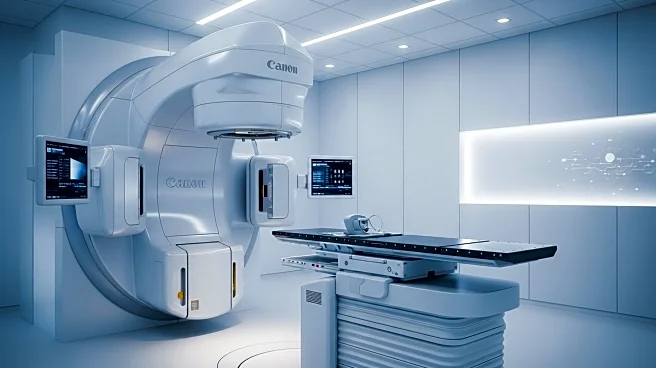What is the story about?
What's Happening?
The global radiation oncology market is expected to grow significantly, reaching USD 32.82 billion by 2034, according to Nova One Advisor. This growth is driven by advancements in radiation therapy, a critical component of cancer treatment. The market is expanding due to the increasing application of radiation therapy for various cancers, including prostate, breast, and lung cancer. North America currently dominates the market, while Asia Pacific is anticipated to grow at the fastest rate. Key segments contributing to this growth include external beam radiation therapy and linear accelerators, which enhance the precision and effectiveness of treatment. Technological advancements, such as intensity modulated radiotherapy (IMRT) and 3D conformal radiotherapy (3D CRT), are also driving market expansion.
Why It's Important?
The projected growth of the radiation oncology market highlights the increasing reliance on advanced radiation therapies in cancer treatment. This expansion reflects the ongoing demand for effective cancer management solutions and the importance of technological innovation in healthcare. As the market grows, it could lead to improved access to cutting-edge treatments, enhancing patient outcomes and survival rates. The focus on precision and targeted therapies underscores the shift towards personalized medicine, which aims to minimize damage to healthy tissues while effectively targeting cancer cells. This trend may influence healthcare policies and investment strategies, encouraging further research and development in radiation oncology.
What's Next?
The radiation oncology market is poised for continued growth, driven by technological advancements and increased investment in cancer research. Companies are likely to focus on developing more precise and effective treatment modalities, such as stereotactic radiosurgery and body radiotherapy. As the market expands, collaborations between healthcare providers, research institutions, and technology companies may accelerate innovation and improve treatment accessibility. Additionally, the growing demand for radiation therapy could lead to increased training and education programs for healthcare professionals, ensuring the availability of skilled practitioners to meet patient needs.
Beyond the Headlines
The expansion of the radiation oncology market raises ethical considerations regarding access to advanced treatments and the potential disparities in healthcare availability. As new technologies emerge, ensuring equitable access to these therapies becomes crucial, particularly in low- and middle-income countries. The focus on precision medicine also highlights the importance of balancing innovation with patient safety, as new treatments must be thoroughly evaluated for efficacy and potential side effects. The integration of artificial intelligence and data analytics in radiation oncology could further enhance treatment planning and outcomes, driving a shift towards more personalized and efficient healthcare solutions.
















